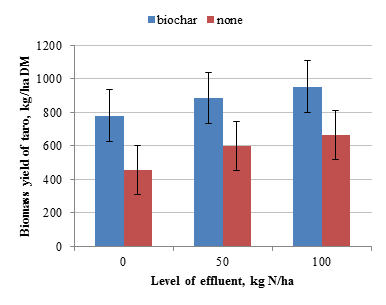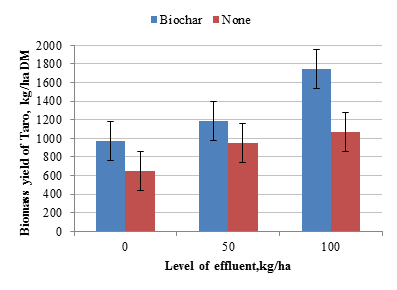 |
 |
| Figure 1: Effect of biochar on total biomass yield, kg/ha DM basis (1st harvest) | Figure 2: Effect of biochar on total biomass yield, kg/ha DM basis (2nd harvest) |
|
Livestock-Based Farming Systems, Renewable Resources and the Environment |
The experiment was conducted at the Integrated Farming Demonstration Centre, Champasack University, Lao PDR to investigate the effect of biochar and biodigester effluent on biomass yield of taro and on soil physical properties. The treatments were arranged in a randomized complete block design (RCBD) as a 3*2 factorial with 4 replications. The factors were application of biochar to soil at 30 tonnes/ha or none and three levels of biodigester effluent at 0, 50 or 100 kg N/ha. Twenty four plots were prepared with a total area of 235 m2. Each plot had an area of 9.8 m2 (2.8*3.5m). Taro was established from seedlings that were on average about 1 month old. Plant spacing was 70 cm between rows and between plants in the row.
Biomass yield of taro at 84 days after planting (Figure 1) and at 112 days (Figure 2) was increased by the application of biochar, and was higher at 122 days of growth (2nd harvest) than at 84 days (1st harvest). Increasing the application of biodigester effluent increased biomass yield, the effect being more pronounced at the second harvest.The water holding capacity of the soil was increased by application of biochar but there were no differences due to the level of biodigester effluent. Soil pH was increased by application of biochar from 5.3 to 5.94. There was no apparent effect of level of effluent on soil pH.
 |
 |
| Figure 1: Effect of biochar on total biomass yield, kg/ha DM basis (1st harvest) | Figure 2: Effect of biochar on total biomass yield, kg/ha DM basis (2nd harvest) |